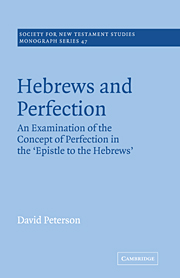Book contents
- Frontmatter
- Contents
- Preface
- Abbreviations
- 1 The Hermeneutical Issues
- 2 The Linguistic Background
- 3 The Perfecting of Christ: The Broad Perspective
- 4 The Perfecting of Christ: His Earthly Struggle
- 5 The Perfecting of Christ: His Exaltation
- 6 The Perfecting of Believers
- 7 Perfection and the Purpose of Hebrews
- Appendix A The Sinlessness of Christ and his Perfecting
- Appendix B When Did Jesus 'Become' High Priest?
- Notes
- Bibliography
- Index of Passages Quoted
5 - The Perfecting of Christ: His Exaltation
Published online by Cambridge University Press: 28 October 2009
- Frontmatter
- Contents
- Preface
- Abbreviations
- 1 The Hermeneutical Issues
- 2 The Linguistic Background
- 3 The Perfecting of Christ: The Broad Perspective
- 4 The Perfecting of Christ: His Earthly Struggle
- 5 The Perfecting of Christ: His Exaltation
- 6 The Perfecting of Believers
- 7 Perfection and the Purpose of Hebrews
- Appendix A The Sinlessness of Christ and his Perfecting
- Appendix B When Did Jesus 'Become' High Priest?
- Notes
- Bibliography
- Index of Passages Quoted
Summary
The theme of exaltation ‘because of the suffering of death’ was announced and applied to Christ in the first context in Hebrews in which he is said to have been perfected (2: 5–10). There, because of the proximity of these themes, several commentators have argued for an interpretation of the perfecting of Christ simply or essentially in terms of his exaltation to heavenly glory and honour. However, the summary nature of 2: 10 was stressed in the exegesis of that passage and the words ‘through sufferings’ were related to the interpretation of 5: 7–9. In the latter context, it was argued that the perfecting of Christ involved the whole process of temptation and testing that culminated in his crucifixion. On this basis it was concluded that the perfecting of Christ in 2: 10 could not be limited to the concept of exaltation.
The final reference to the perfecting of Christ (7: 28) comes in a context where the focus is particularly on his exaltation, and only brief mention is made of the preceding sacrifice (7: 27) and the personal qualities that make him superior to any earthly mediators (7: 26). Here, as I shall demonstrate, the concluding verse can only be properly understood in the light of an exegesis of the whole chapter, since it recalls, in a series of intricate contrasts, the preceding arguments. However, the τετελειωμένον of that verse cannot be understood in terms of the preceding context alone.
- Type
- Chapter
- Information
- Hebrews and PerfectionAn Examination of the Concept of Perfection in the Epistle to the Hebrews, pp. 104 - 125Publisher: Cambridge University PressPrint publication year: 1982



